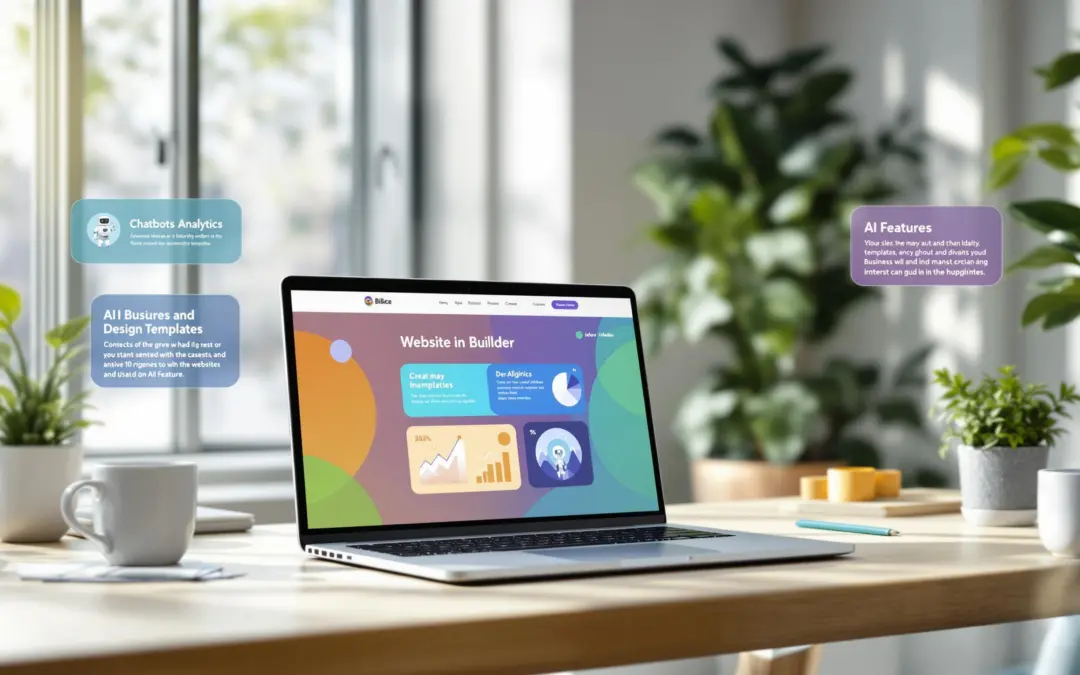- Quick Website Creation: Save up to 75% of the time compared to traditional methods. Tools like Wix ADI can create a website in just 5 minutes.
- Smart Design Suggestions: AI optimizes layouts, color schemes, and typography for better engagement and conversions.
- AI Text and Image Creation: Generate SEO-friendly content and visuals instantly using tools like ChatGPT-4 and DALL-E.
- AI Chatbots: Provide 24/7 customer support, reduce costs, and improve satisfaction with tools like Intercom‘s Resolution Bot.
- AI-Driven SEO Tools: Automate keyword research, fix technical issues, and improve website visibility with tools like Semrush.
- Smart Content Personalization: Tailor user experiences in real-time to boost engagement and sales.
- AI Website Analytics: Turn data into actionable insights for improving conversions and user experience.
Quick Comparison of AI Website Builders:
| Feature | AIZI (£16/mo) | Brizy ($49/yr) | 10Web ($24/mo) |
|---|---|---|---|
| Design Tools | Advanced | Moderate | Basic |
| Content Tools | Full Suite | Limited | WordPress Only |
| E-commerce | Built-in | Plugin Required | WooCommerce |
| Analytics | Advanced | Basic | Comprehensive |
| Support | 24/7 AI + Human | Email Support | Dedicated Team |
Actionable Tip: Start by identifying your business goals and choose an AI website builder that aligns with your needs. Focus on tools that save time, enhance design, and improve customer engagement.
The 5 BEST AI Website Builders Of 2025
1. Quick Website Creation with AI
AI-powered website builders have transformed how quickly businesses can establish their online presence. These modern tools can cut website creation time by up to 75% compared to traditional methods[2]. This means businesses can launch faster and seize market opportunities without unnecessary delays.
Platforms like Wix’s ADI (Artificial Design Intelligence) make this process even faster. By inputting just a few business details, users can have a fully functional website ready in 5 minutes[10].
"During the COVID-19 pandemic, restaurants using AI website builders were able to add online ordering and delivery information to their sites, adapting to new market conditions in days rather than weeks – a critical advantage for maintaining revenue streams during disruptions"[4].
These time savings are a game-changer. Studies show that 68% of small businesses reclaim 5+ hours per week[12], while AI-optimized designs improve conversions. Tools like Zyro and AIZI (£9/month) combine fast website creation with brand-consistent content, giving businesses a strong start.
Key features that save time include:
- Automated responsive designs for all devices
- Instant content generation tailored to the business type
- Pre-integrated tools for essential functions
This speed sets the stage for businesses to explore advanced AI tools like smart design suggestions, which we’ll dive into next.
2. Smart Design Suggestions
Smart design tools turn AI’s speed into a powerful visual strategy, helping businesses achieve growth by aligning design with their goals. These tools take the rapid output of AI and transform it into visuals that resonate with users.
AI-powered design tools can reduce website design time by 60% [5], while fine-tuning key elements like color schemes, typography, and responsive layouts to boost engagement.
Here’s how these systems handle critical design decisions:
- Color schemes: Automatically pulled from your logo or brand assets.
- Typography: Selected to ensure content is easy to read.
- Layouts: Adjusted based on the type of content you’re showcasing.
- Responsive design: Optimized for seamless performance on any device.
Platforms like Canva’s Brand Kit [13] ensure your visuals stay consistent across all platforms, saving time and effort.
The impact of these tools is clear. For example, Blissful Botanicals, an e-commerce startup, saw a 28% increase in site engagement and a 15% boost in conversions after using AI-suggested layouts in 2023. This directly contributed to an 18% rise in their Q3 2023 revenue [4].
3. AI Text and Image Creation
AI-powered content creation tools are transforming how businesses scale their content production. Many modern website builders now include features like ChatGPT-4 and Stable Diffusion, which can generate everything from product descriptions to blog posts and custom visuals. This not only saves time but also allows teams to focus on bigger growth strategies.
Text Generation Tools
AI writing tools, like Wix’s AI Text Creator [1], can handle a variety of content needs:
- Product descriptions: Proven to boost sales by 15% [3].
- SEO-focused content: Blog posts, meta descriptions, and more.
- Email campaigns: Generate engaging email copy effortlessly.
- Custom FAQs: Quickly create tailored answers for customer queries.
Creating Visual Content
With tools like DALL-E [2], businesses can produce original visuals without relying on stock photos. These AI-generated images can serve as a creative base for further refinement.
Impact on Business Performance
AI-generated content isn’t just convenient – it delivers results. For instance, HubSpot reports a 35% improvement in conversions when AI-generated content is fine-tuned by humans [14].
How to Use AI Content Effectively
To get the most out of AI tools, follow these tips:
- Provide detailed prompts to guide the AI for better accuracy.
- Review and edit AI outputs to ensure they match your brand’s tone.
- Use AI-generated visuals as a starting point and refine them for a polished look.
- Test variations through A/B testing to identify what works best.
4. AI Chatbots and Customer Support
AI chatbots are changing how businesses interact with customers, especially when integrated into modern website builders. These tools offer real-time, personalized support, reducing costs and increasing customer satisfaction. By automating repetitive tasks, chatbots not only help businesses retain customers but also boost efficiency. This round-the-clock support connects seamlessly to the next topic: AI-driven customer insights.
Around-the-Clock Assistance
AI chatbots can manage multiple queries at once, offering consistent help 24/7. For example, Intercom’s Resolution Bot handles up to 33% of standard customer questions without needing human input[10].
Smart Blends of Automation and Human Touch
Some tools combine AI-driven automation with human oversight. Zendesk’s Answer Bot is a great example, automatically resolving simple issues while giving agents access to conversation histories. This approach has led to a 15% boost in customer satisfaction scores[4].
Success Stories with Measurable Results
The impact of AI chatbots is clear in results like those from Vodafone’s TOBi chatbot, which achieved:
- 68% resolution rate on first contact
- 30% drop in customer churn[7]
- Noticeable reductions in wait times for support
Tips for Effective Use
To get the most out of AI chatbots:
- Define Capabilities Clearly: Let users know what the chatbot can and can’t do.
- Plan for Escalations: Ensure there’s a way to hand off complex issues to a human.
- Use Data to Improve: Continuously refine responses based on user interactions.
sbb-itb-037452d
5. AI-Driven SEO Tools
AI tools aren’t just about chatbots; they play a key role in making sure your audience can find your site in the first place. These tools, integrated into modern website builders, simplify technical SEO tasks and help identify keyword opportunities to drive growth.
Automated SEO Analysis and Fixes
AI tools constantly monitor websites for technical issues, offering instant solutions to common problems. Take Screaming Frog’s SEO Spider tool as an example – it uses machine learning to pinpoint and prioritize SEO issues, cutting down the time needed for audits[9]. These tools can handle tasks like:
- Detecting broken links
- Checking mobile responsiveness
- Optimizing page speed
- Managing XML sitemaps
Smarter Keyword Research
AI has reshaped how businesses approach keyword research. Tools like Semrush’s Keyword Magic Tool analyze search trends and provide keyword suggestions in seconds[6]. Some standout features include:
- Grouping keywords by search intent
- Scoring keyword competition difficulty
- Estimating potential traffic
Proven Results
For instance, Expedia Group leveraged Botify’s AI platform to boost crawl efficiency by 50%, leading to a 25% year-over-year increase in organic traffic. This upgrade also drove a 12% rise in booking conversions[2].
Streamlined Technical SEO
Modern AI tools simplify even the trickiest technical SEO tasks. They focus on essentials like:
- Monitoring and improving page speed
- Automatically optimizing for mobile
- Generating schema markup for rich snippets[8]
AI-driven SEO tools are transforming how businesses optimize their websites, saving time and delivering measurable results.
6. Smart Content Personalization
AI-driven personalization tailors website experiences for individual visitors in real-time. This approach focuses on turning traffic from AI SEO tools (discussed in Section 5) into meaningful engagement and conversions.
How AI Personalization Works
AI uses data like browsing behavior and device preferences to adjust website content dynamically. A great example is Amazon’s recommendation engine, which generates 35% of their total sales through personalized product suggestions[9].
Key Personalization Features
The best AI personalization tools optimize several key areas of a website, such as:
- Customizing homepage layouts based on user interests
- Suggesting products based on browsing history
- Automatically adjusting currency or language settings
- Delivering targeted offers based on user engagement
Impact on Business Performance
AI personalization has a proven track record of boosting business metrics. Research from Epsilon shows that 80% of consumers are more likely to buy when they experience personalized interactions[3]. Monetate further highlights this with their findings:
"Businesses using AI-driven personalization saw a 20% increase in sales on average", according to a Monetate study[4].
Balancing Personalization and Privacy
To ensure user trust, businesses must take privacy seriously by:
- Being transparent about data collection methods
- Offering clear opt-in and opt-out options
- Complying with GDPR and similar regulations
- Focusing on anonymous data whenever possible
Getting Started with AI Personalization
For businesses new to this, tools like AIZI’s website builder provide an easy starting point. Their AI Website Builder & Chatbot plan includes personalization features that require no technical expertise. A smart way to begin is by implementing location-based adjustments, then gradually introducing advanced features as more data becomes available. This step-by-step approach mirrors the data-driven strategies discussed in AI analytics (Section 7).
7. AI Website Analytics
AI-powered website analytics go beyond just gathering data – they turn it into actionable strategies. By analyzing customer behavior and automating adjustments, these tools help improve conversions and refine the user experience. Think of it as the final piece in the puzzle, complementing the quick creation tools (Section 1) and SEO/personalization efforts (Sections 5-6).
Beyond Basic Metrics
AI analytics tools provide a deeper dive into data, offering insights like:
- Predictions about customer lifetime value
- Identifying users likely to stop using your service
- Spotting unusual trends automatically
- Mapping out customer journeys
- Analyzing the tone of customer interactions
Real-World Examples
The impact of AI analytics is clear in real-world results. For instance, Under Armour used predictive analytics to fine-tune their supply chain, cutting overstock inventory by 20%. Netflix leverages AI to enhance customer retention, saving an estimated $1 billion annually[6]. These examples illustrate how data-driven decisions directly boost efficiency and revenue.
"Companies using AI-powered analytics report a 20-30% increase in conversion rates on average[2]"
What You Need to Get Started
To successfully use AI analytics, focus on:
- Collecting data from all your platforms in one place
- Processing data quickly for real-time insights
- Prioritizing strong privacy measures
Balancing Insights with Privacy
As privacy concerns grow, AI analytics tools are adapting. They now offer features like:
- Collecting data anonymously
- Ensuring secure storage and handling
- Clear and transparent policies on how data is used
Start Small with Built-In Tools
Platforms like AIZI come with built-in analytics tools that track performance and offer improvement suggestions. These tools are designed to deliver actionable insights without compromising on privacy.
AI Website Builder Comparison
Choosing the right AI website builder can play a big role in growing your business. Each platform has its own strengths, offering different features to suit various needs. Here’s how some of the top options compare:
Core Features and Performance
- AIZI: Offers AI design automation combined with a user-friendly drag-and-drop interface. It also includes AI-driven content creation tools, making it ideal for simplifying workflows.
- Brizy: Stands out with its focus on template generation and visual editing, making it a great choice for businesses that need landing pages created quickly.
- 10Web: Specializes in optimizing WordPress sites, improving both SEO performance and user experience.
Price-to-Value Analysis
Each platform’s pricing reflects its focus on supporting business growth:
| Feature Category | AIZI (£16/mo) | Brizy ($49/yr) | 10Web ($24/mo) |
|---|---|---|---|
| AI Design Tools | Advanced | Moderate | Basic |
| Content Creation | Full Suite | Limited | WordPress Only |
| E-commerce | Built-in | Plugin Required | WooCommerce |
| Analytics | Advanced | Basic | Comprehensive |
| Support | 24/7 AI + Human | Email Support | Dedicated Team |
Platform Ratings
- AIZI: 4.7/5 on G2, based on 150 reviews [16].
- Brizy: 4.5/5 on Capterra [5].
- 10Web: 4.3/5 on TrustPilot [15].
Specialized Features
Each platform brings something extra to the table to support business growth:
- AIZI: Offers brand-aligned content generation and UK-based hosting.
- Brizy: Includes a visual editor and the option for a lifetime license.
- 10Web: Focuses on WordPress performance optimization and automated site maintenance.
Next Steps
Ready to put these AI features into action? Here’s a clear plan to help you move forward:
Assess Your Current Position
Begin by reviewing your website’s performance metrics. Pinpoint areas where AI can have the most impact. For instance, if your conversion rate is lagging behind industry benchmarks, consider prioritizing AI-driven personalization. Research indicates that websites using AI can boost conversion rates by up to 30% [11].
Implementation Roadmap
- Lay the Groundwork: Evaluate your current site against the AI features discussed in Sections 1-7.
- Quick Wins: Start with easy-to-implement tools like design enhancements (Section 2) and basic chatbots (Section 4).
- Enhance Performance: Incorporate personalization tools (Section 6) and advanced analytics (Section 7).
- Full Integration: Connect all AI features to create a seamless workflow.
Monitor and Measure Success
Keep an eye on metrics directly linked to the AI tools you introduce. For example, measure how personalization impacts user engagement (Section 6) or track the success rate of chatbot interactions (Section 4).
Best Practices for Implementation
To ensure a smooth rollout, consider these strategies:
- Run Tests: Use A/B testing to evaluate AI-generated content and features.
- Team Training: Equip your team with the knowledge to use AI tools effectively.
- Quality Control: Regularly review AI outputs to maintain your brand’s tone and style.
Security and Compliance
Protect customer data by implementing AI solutions with strong security measures. For example, AIZI provides secure UK-based hosting, daily backups, and routine security checks to safeguard data and meet compliance standards.
Technical Support
Make sure you have reliable technical support throughout the implementation process to address any challenges quickly and efficiently.
FAQs
What is the best AI website builder for WordPress?
The best AI website builder for WordPress depends on your goals and technical requirements. These tools integrate AI features while working seamlessly within the WordPress ecosystem.
| Builder | Key Feature | Price |
|---|---|---|
| Elementor AI | Automated Design Optimization | $59/year |
| ZipWP | Fast Website Creation | Free |
| Kubio AI | Easy-to-Use Interface | Free |
Elementor AI stands out with its automated layout and content tools, helping businesses create conversion-friendly designs. It has an impressive 4.8/5 rating from over 5,000 reviews [2].
ZipWP is great for businesses that need a website quickly, as it cuts creation time by 90% [1]. Its free plan includes essential AI features for launching fast.
Kubio AI is perfect for beginners, offering a user-friendly editor and a smooth onboarding experience, making WordPress site building much easier.
Here’s how to decide:
- Focus on conversions? Go with Elementor AI.
- Need speed? ZipWP is your best bet.
- Looking for simplicity? Kubio AI is ideal.



